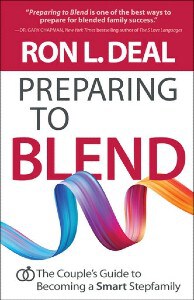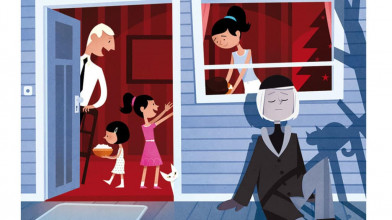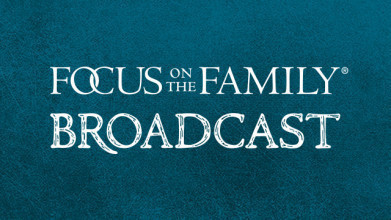John Fuller: Today on Focus on the Family, we’ll explore the complicated family dynamics of remarriage.
Preview:
Ron Deal: If you’re thinking, I fell in love with a person, that’s really all there is and because you and I are in love, the kids are gonna love that we love each other, well sometimes they do and sometimes they don’t, or sometimes they’re a little confused by it. It. Uh, often, children experience both, um, things. They experience happiness that mom’s getting married, and they like the stepdad, and there’s something about him that they’re really drawn to, and at the same time they feel a little weird about drawing into him when their biological dad is un-, in, somewhere else, and they don’t get to spend as much time with him as they would like to. But yet, I’m spending more time with my stepdad. And it’s just sort of a confusing place for kids.
End of Preview
John: Some great, uh, insights from Ron Deal today, and we’ll, uh, continue the conversation about remarriage. Uh, your host is Focus President and author Jim Daly, and I’m John Fuller.
Jim Daly: Uh, John, we had a really insightful conversation last time with Ron-
John: Mm-hmm.
Jim: … uh, discussing the complex and sometimes confusing web-
John: Mmm.
Jim: … of relationships that are created with stepfamilies. It just is what it is. And, uh, typically, uh, they begin with a couple who have come together after a divorce or maybe a death of a spouse. I have, uh, two friends that are going, uh, into marriage right now, and that’s what happened, they both lost their, uh, their spouses, and they’re remarrying. But you add to that mix, children, uh, biological and step kids who now have to live together and learn to get along and to embrace each other. And don’t forget former spouses who may be involved with those kids and their lives. Plus, uh, extended grandparents, maybe not four, but eight sets of grandparents now.
John: Mm-hmm.
Jim: I mean, it, it just does create more complication. And I’m very proud to be able to have Ron on to talk about these things so that we can help equip these couples to do the best job they can in Christ, to bring that family together, and patch those cracks, and live for Him, and uh, therefore help train up those children and make sure they’re an example for how to love the Lord and love each other in that family.
John: Mm-hmm. Yeah, Ron Deal has captured a lot of his expertise and insights in a book called, Preparing to Blend: The Couple’s Guide to Becoming a Smart Stepfamily. And if you’d like a copy, uh, reach out to us, our number is 800, the letter A, and the word FAMILY, or online you’ll find us at focusonthefamily.com/broadcast.
Jim: Ron welcome back to Focus on the Family.
Ron: Thank you, it’s always good to be here.
Jim: When you get back to Family Life say hey to Dave, and Anne, and tell ’em hi.
Ron: I will.
Jim: (laughs).
Ron: I will.
Jim: Hey, before we jump into the content of your book, which is really good, and I hope if people missed it last time, they can, uh, download it on the smart phone app-
John: Mm-hmm.
Jim: … or go to the website and download it that way, ’cause it was really, I think it was really good. You have mentioned, and you use in your, your subtitle, “Becoming a Smart Step-family.”
Ron: Mmm.
Jim: What does that mean?
Ron: Yeah.
Jim: I’d like to become smart just because.
Ron: Right, right.
Jim: (laughs).
Ron: The reason smart is in most of the titles of my books is because when you try to apply first family answers to second family questions, you’re dumb. (laughs).
Jim: Wow.
Ron: I hate to say it.
Jim: Okay. No, that’s interesting.
Ron: But but you have just taken the wrong turn. When you get second family answers to second family questions, you’re getting smart. You’re smarter about the process. So many blended family couples are working hard to try to make it all work and actually they’re trying to force it to work on their time and in their way. And it’s just creating more pushback and hesitation from children, and they’re really not helping the process, they’re hurting their own process. And so we help them work smarter, not harder.
Jim: Yeah, you know, last time I’d say we covered a lot of 30,000-foot view-
Ron: Mm-hmm, mm-hmm.
Jim: … issues. And I’m gonna drill down a little bit-
Ron: Okay.
Jim: … it might be like a 10,000-foot issue here, or sea level.
Ron: Okay.
Jim: Finances can tend to be such a struggle in all relationships.
Ron: Yeah.
Jim: Uh, but in, in stepfamilies, blended families, it can really become a big issue. I think your research indicated that one in four step couples, uh, will have intentional conversations about their finances.
Ron: Only.
Jim: But that’s only … Yeah, I was gonna say-
Ron: One in four.
Jim: … it’s 25%.
Ron: Yeah.
Jim: What, what’s going on for the 75%?
Ron: Well, I think a lot of people are just avoiding it because th-, the assumption of goodwill. And this makes a lot of sense to me. By the way, let me back up. Me as a marriage and family minister and therapist who worked in local churches for a good part of my career, I didn’t talk about finances when I was doing premarital counseling with coup- … I mean, maybe just skirted past it.
Jim: Make sure you have a bank account.
Ron: I too-
Jim: (laughs).
Ron: … had the same assumption, “Hey, you love each other, it’s gonna be okay.” When it comes to blended family couples in particular, I mean I don’t think that’s necessarily true with first marriages. I really know it’s not true with blended couples because it is again, so much com-, so much more complex. How their gonna manage money, the finances, their assets, all the stuff they’ve acquired, “Am I gonna put your name on the house? Do we change beneficiaries on the life insurance?” On, and on, and on it goes. I now think we have a moral obligation in doing premarital prep to help these couples really think through this.
Jim: Yeah.
Ron: I discovered this a few years ago, partnered with a couple of guys who know a lo-, whole lot more about finances than I do, and we wrote an entire book on this subject for, on stepfamily finances. I had to put something into this book on preparing to blend, because I just think we just sort of skirt around it. We wanna drill down to h-, how are you gonna combine money after the wedding? How are you gonna wrestle with, uh, long-term estate planning? How are you gonna deal with beneficiaries on life insurance? And an-, et cetera, et cetera, et cetera. If you’re getting married in the mid-50s or early 60s, people have a lot of stuff. And, you know, the whole reason the whole, y-, you know, let’s f-, sing this legal document saying what you’re not gonna get if I divorce you.
Jim: Mm-hmm.
Ron: K-, the prenup thing. That’s what, the whole reason that came into be is ’cause people didn’t know what to do with their stuff. We wanna help people turn that into an asset for your marriage, not something that divides you and creates animosity around you’re getting or not getting. We wanna help you see it as, “We negotiate this, we talk about this, we drill down, and create a plan so that you and I both feel cared for, we feel confident that our children are gonna be provided for if the worst happens.” And now all of a sudden confidence in our us-ness goes up.
Jim: Yeah, in fact, do you call that the togetherness agreement?
Ron: The togetherness agreement.
Jim: Yeah. I like that title-
Ron: Is what the title is.
Jim: … better than prenup-
Ron: Exactly.
Jim: … which sounds like a medical term. (laughs).
Ron: (laughs). Exactly.
Jim: Hey, another huge issue for step couples can be how they will parent their kids obviously.
Ron: Yeah.
Jim: That’s probably the number one issue, if there’s kids in the, in the picture. I guess it’s normal to have some divided loyalties, and we started talking about that last time. But that’s gotta break a, a stepparent’s heart. I mean, if the remarriage, you’ve got, their, your biological children-
Ron: Mm-hmm.
Jim: … and the step-spouse is coming in-
Ron: Mm-hmm.
Jim: … you got these divided loyalties, you don’t know how to manage, uh, prioritization, you feel guilty. And I think moms particularly feel so guilty with their kids and the loss that they’ve had, and the things we’ve talked about. Um, h-, how do you, how do you gently begin that re-prioritization in a smart way? Back to that word-
Ron: Mm-hmm.
Jim: … so that, uh, y-, you know, your new husband isn’t feeling left out, your kids aren’t feeling left out? And I’m assuming, there’s no perfect mark.
Ron: Mmm.
Jim: It’s just like a continuum-
Ron: Right.
Jim: … that some days you’re hitting it, other days you’re gonna miss it.
Ron: You know, for a lot of couples … Well, for all couples who are raising children (laughs), um, finding parental unity around any given decision is often what makes it the right decision.
Jim: Mm-hmm.
Ron: I mean, there’s a lot of gray in parenting, we all know that, but when you find unity in how we’re gonna move forward, now we’ve kind of got the right decision. For blended family couples there are multiple layers around this whole parenting dynamic, and it depends on if only one adult has kids, or they both have kids, or maybe they’ve had a, a, a common child together. There’s all kinds of different layers. Finding unity is utmost, sorting through the layers, sorting through your preconceived notions of parenting and your philosophies of parenting, all those kinds of things that are a part of the combination and getting to, “how are we gonna lead together? What’s your role with my kids? What’s my role with your kids?” Um, sorting through that and, and, and moving forward is really important. I, I, let me just say this. I, for years I struggled talking about the dynamics of parenting, putting words on it in, in all the previous books I’ve written, I’ve spent a lot of time fleshing this out. But I never really th-, I don’t think I put together a plan that really helped couples walk through a process of deciding how they’re gonna parent together, and I think we did that in this book for the first time.
Jim: That’s big.
Ron: It is big. So it starts with, “how were you parenting? How was I parenting? What did we grow up with? How have I been parenting my three kids who are now in their early 20s and late teens? And how about you and your kids that are in their early teens?” And the history matters, right? ‘Cause kids are used to a certain system, and expectations, and f-, you know, consequences. All of that matters. And so it sort of systematically takes them through this dialog until they get to a place of, “all right, here’s where we’re the same, here’s where we differ, here’s where we got some decisions to make. Now what do w-, now let’s figure out how we move forward.” That is so important.
Jim: Yeah. You know Ron, just through life experience and observing friendships where things have happened, spouses have died, remarriage occurs, or there’s a breakup in the family and there’s a remarriage. O-, one thing that I’ve seen that I’d like you to address is where, uh, that stepfather in the cases that I’m thinking of, you know, he comes in, pretty, pretty spiritually disciplined person-
Ron: Mm-hmm.
Jim: … maybe the previous dad didn’t have quiet that bent, and what you see is, um, kind of the reward situation.
Ron: Hmm.
Jim: And I know you’re gonna connect-
Ron: Mm-hmm.
Jim: … with this ’cause you’ve probably counseled families like this, where as long as you’re dancing to the right tune, the new stepdad is pretty happy.
Ron: Mm-hmm.
Jim: But if you’re grieving the loss as that child of your lost parent, however that might’ve occurred, and you’re in a funk. I mean-
Ron: Mm-hmm.
Jim: … I, I know a teenage boy-
Ron: Yeah.
Jim: … that just didn’t recover well and the stepdad, it, it just didn’t work because he was expecting more obedience, more behavior, appropriate behavior out of that son and it didn’t happen. And it’s kind of tragic to watch it happen-
Ron: Yeah.
Jim: … and and fall apart. And the other, uh, siblings are doing well, and, you know, spiritually doing well, but there seemed to be kind of this reward system there that was perplexing to me.
Ron: So it sounds like this stepfather in this case is conditional?
Jim: Correct, yeah.
Ron: In terms of his lo- … So, if he starts pulling back, saying, “Well, you’re not performing.” I mean, that’s essentially the message, “If you perform well then you’re accepted or embraced.” I, I mean, a-, any parent who does that is sending the wrong message about God. Right? ‘Cause ultimately this is a-, all vertical, our parenting is horizontal on earth but it’s vertical in the hearts, and minds, and souls of our kids. So I would encourage that, that man to say, “You know, what’s going on with me? What is it that I … am I feeling rejected or disrespected? And, and so that leads me to wanna pull away and back up, and, a-, a, and not really invest in you anymore?” Uh, that’s, that’s about the stepdad, that’s a journey he’s gotta wrestle with. There’s something there in him that is leading him to feel like pulling away is the only option. I would much rather him say, “You know, I need to lean in. I, I, maybe adjust my expectations of this child, but I need to tune in to what that kid needs.”
Jim: You know, I’m thinking of the Lord leaving the 99 for the one.
Ron: Ye-, that’s right. Keep pursuing.
Jim: And, you know, a-, all of us as parents can make that mistake. I’m not going after that example other than it’s very instructive about how we parent generally.
Ron: He-, hey Jim, here’s the bottom line, stepparents have an incredible opportunity-
Jim: Mmm.
Ron: … to minister to the heart of of their stepchildren. It doesn’t mean it’s an easy road, yeah, there’s a lot of question marks. But press in, because I believe you, you’ve been positioned there, God has given you an opportunity to minister to their hearts, and please look for ways to do that.
Jim: Well, and I guess one of the things too is the observation temperamentally of how all the kids are dealing with the trauma of that loss.
Ron: Mm-hmm, mm-hmm.
Jim: And they’re, you know, I’m a optimistic extrovert-
Ron: Mm-hmm.
Jim: … so I’m happy, I can make it, I’m getting along. Another child may respond differently to that.
Ron: Right.
Jim: Where they literally for years will carry the burden of that situation.
Ron: Mm-hmm.
Jim: And they don’t get out of it.
Ron: Right.
Jim: Um, and you, you’ve gotta be in tune with that as a parent-
Ron: One of the-
Jim: … or a stepparent.
Ron: Yes, one of the things we teach stepparents is pace with the child. Pace is meet them where they are, uh, you know, I hate to say it, but you often get the short end of the stick as a stepparent.
Jim: Mm-hmm.
Ron: They’re asking you to cook meals, and do their laundry, and take ’em to soccer practice, and yet they don’t really give you, their heart. They don’t really allow you into the inner parts of, their, their life. They just sort of ask stuff from you. And that’s really a hard place to be as a stepparent.
Jim: Is it fair to say though, as a stepparent, not as the child, ’cause you don’t have the capacity, you gotta earn your way in there?
Ron: Yes, you do have to build that relationship.
Jim: Yeah.
Ron: I-, just like, here’s another great analogy, how do you build a friendship with a, with a new f-, neighbor?
Jim: Right.
Ron: Yo-, you don’t run two doors down and, “Hey, you guys just moved in, I’m your new best friend.”
Jim: Or how about-
Ron: That doesn’t work.
Jim: … “You respect me ’cause I told you so?”
Ron: Exactly, you know-
Jim: You don’t say that to your neighbors.
Ron: Yeah, that’s right (laughs).
Jim: (laughs). Usually.
Ron: “I’m angry at you so that should help us have a friendship.
Jim: Right, that’s a good analogy.
Ron: That’s not the way it works.
Jim: Yeah.
Ron: Like, no, you have to meet that new neighbor where they are, start small, find something you have in common, and grow from that. It’s hard as a stepparent to be in that specific situation, because you’re hoping for more.
Jim: Mmm.
Ron: I mean, Jim, what’s often behind this is a stepparent who has the biggest heart in the world for these kids, wants to help, wants to love ’em, wants to be considered a family member in their life, and that’s such a marvelous quality about them. We’re just gonna say, Okay, use that, but pace at a level where they can receive it. They’ve got a lot of emotional stuff they’re working through; you just can’t push yourself on them, you’ve gotta meet them where they are.
Jim: Yeah. Uh, Ron, um, grief strikes all of us-
Ron: Yeah.
Jim: … somewhere, somehow. I mean, it’s part of life. Uh, people are gonna hit that grief valley, and that’s one thing I wanted to cover with you.
Ron: Yeah.
Jim: Because y-, you are a, a, a specialist here, you’re a tactician, you didn’t grow up in a broken f-, home, your, your still married to Nan, your first wife.
Ron: Mm-hmm.
Jim: So, but you’re really astute on these things and what, um, stepfamilies need to do. And you’re a minister to the stepfamily, so I so appreciate that. But you have experienced grief-
Ron: Yes.
Jim: … you and Nan lost a child. Speak to that, um, life experience, and tell us what happened and how that has helped you in who you are today?
Ron: Uh, we lost our son Connor when he was 12. It has been 13 years.
Jim: Mmm.
Ron: If you guys can imagine-
Jim: Yeah.
Ron: … we crossed a line this past year where it’s been longer without him than we had him.
Jim: Yeah.
Ron: And that was another aftershock-
Jim: It’s a milestone-
Ron: I mean-
Jim: [inaudible], yeah.
Ron: … you have earthquakes and then you have aftershocks, and the aftershocks don’t stop. Um, we are very well-acquainted with grief and the pain that it brings to your heart and life, and how it just never goes away. You learn how to walk with it, that’s I think the challenge of grieving-
Jim: Yeah.
Ron: … is learning how to walk with it. The reason this conversation’s relevant to preparing to blend is because grief and loss is the backdrop, it’s the undercurrent in which a blended family is formed. And it doesn’t stop, it carries right into the new blended family. I-, in the, in the form of little aftershocks. Right? So I want you guys to catch this significant point, because we do talk about it in the book and it’s really important for pastors as well as couples alike. The wedding is this monumental moment where there’s lots of joy, and there’s lots of anticipation and excitement for the couple. Their romance is culminated in a process of commitment in marriage. And for their children it is that and all at the same time, another aftershock, another ripple of loss in the narrative of the earthquake that gave birth to this moment. So, “I’m thrilled dad’s walking down the aisle with this beautiful woman that’s his new wife, and she is so kind to me, and she has such a big heart. And I really, really appreciate my stepmom now. And at the very same time it feels so weird to see dad kiss another woman. It feels so strange that it’s not mom-”
Jim: Mm-hmm.
Ron: … “in the house asking me to clean up my socks, n-, you know, clean up the, the bedroom.” It is both/and. And so with joy, sweet, comes loss, bitter. And bittersweet creates confusion in children. So weddings are about thrill for adults who if they expect that same reaction from children and don’t see it, don’t get it. A lot of later life couples who are marrying with adult children, “My kid’s 30 and 32 and they’re gonna be great with …” Well, no, you know, they’re gonna have loss too. They’re gonna-
Jim: Right.
Ron: … be s-, at the wedding going, “where’s mom?” That’s the same thing, it doesn’t matter their age. If you can’t see that loss as an adult who’s marrying and say, “Wow, you know what? I bet this is hard for you. You wish mom were here. This is so weird. I bet it’s just strange for you to see me with this other woman.”
Jim: Mm-hmm.
Ron: “I’m okay with that. It’s okay, let’s talk about it.” That is the right move-
Jim: Mm-hmm.
Ron: … to step into that child’s sadness so that you can continue grieving forward as a family. One of the things that I really don’t like about, uh, blended families who say, “Okay, done with the old, in with the new,” is that, in this case of dad getting married aga-, he stops grieving with his children. They stop talking about mom, they stop going to the cemetery and reminiscing, or looking at old photos or videos of mom. Why? Because he’s now married to another woman, and he doesn’t wanna hurt her feelings. So he has to abandon his children in their loss narrative. That’s another loss.
Jim: Mmm.
Ron: That just makes it harder for them to see their stepmom as, as a gain in their world and life.
Jim: Mm-hmm.
Ron: It’s like everybody sort of just gets stuck in that awkwardness. The way through it is to not be avoiding the past, but to be continuing to talk, to grieve, to share, to reminisce, and at the same time, move into the present.
John: Mm-hmm. This is Focus on the Family with Jim Daly. Uh, we’re hearing wisdom from Ron Deal, and, uh, a lot of his ideas are captured in a terrific book called Preparing to Blend: The Couple’s Guide to Becoming a Smart Stepfamily. Get your copy of this excellent resource when you call us, our number is 800, the letter A, and the word FAMILY, or stop by focusonthefamily.com/broadcast.
Jim: I-, I, so much of what you’re saying there Ron is being the adult in the room-
Ron: Mm-hmm.
Jim: … I’m thinking of younger kids obviously, uh, not adult children.
Ron: Mm-hmm.
Jim: But y-, you do need to be the adult, and sometimes that’s hard ’cause we g-, we get the lizard brain, right?
Ron: Yes.
Jim: And we wanna fight down really low, and emotionally, and. “Just do it because I said do it.”
Ron: Mm-hmm.
Jim: And, uh, boy we gotta refrain from that, ’cause the kids are so fragile right there.
Ron: Yeah.
Jim: And they’re looking to you, even in the taunting that they may be doing, they’re looking to you for stability, and, you know, some kind of answer that gives-
Ron: Yes.
Jim: … them confidence th-, that we’re on the right path here.
Ron: The reason and adult-
Jim: (laughs).
Ron: … would get controlling in that moment, “Just do it ’cause I told you so,” “come on, why can’t you get along? She’s a great person, why don’t you love her the way I love her?” Eh, that’s fear.
Jim: Right.
Ron: It, there’s a pain deep inside that says, “Oh no, if my kids don’t embrace this, w-, us, our family’s gonna, a-, and it’s not gonna be a blessing to them, and I want this whole thing to be a blessing to them.” Of course you do, uh, a-, and so your pain and your fear grab you in that moment and now you gotta get controlling to somehow break through this little moment with your kids. No. The way to do that is to get soft and chase their pain. Be the adult, instead of wrapped up in your own, say, “so tell me what’s going on? How’s that feel?”
Jim: Right.
Ron: Uh, uh, eh, “You’re feeling a little worried that if she comes in and you like her, it’s gonna be hard on your relationship with your mother,” or “It’s hard to remember mom if mom is deceased when she’s here.” Like, “Tell me what that’s like for you.” Now we’re letting grief do its job and we’re grieving together-
Jim: Yeah.
Ron: … parent and child, so that we can walk together into the new future.
Jim: Well, another example, that I am aware of a family, the mom died at a young age to three young children. Um, when he remarried the new stepmom came in, saw all the photos of her-
Ron: Mm-hmm.
Jim: Said, “No, we gotta take all those down. Put photos of us up.”
Ron: Yeah.
Jim: That, that can be that kind of emotional reaction-
Ron: Mm-hmm.
Jim: … ’cause you’re not understanding the full picture.
Ron: Yeah.
Jim: What’s really happening? It, it, it is about you.
Ron: Yeah.
Jim: And that’s not good.
Ron: We addressed that recently on the Family Life Blended podcast that I do. Um, I, I think there’s a big temptation there. Again, stepmom saying, “I’m going to come in, we need to make this my space.” And yes, you do need to put your fingerprints on your new living space, and children need to have photos of their mom. Now, over the mantel? No. You can say no to that one, “Not in the living room,” but in their space-
Jim: All that’s delicate.
Ron: (laughs), it is.
Jim: Wow, even saying that’s like, “Whoops.” But it’s right.
Ron: But it’s right. You know? So it’s a both/and. It is never either/or. Like either/or just divides families ironically, families that are trying not to divide. That’s what you’re doing is dividing. But both/and says, “We honor the past, we recognize the present, we’re walking into the future together, so let’s do this as a team.”
Jim: you compare kind of this merger process, these two adults coming together with kids-
Ron: Mm-hmm.
Jim: … into this new family as a tank full of water.
Ron: (laughs).
Jim: How do, how do you get there?
Ron: Well-
Jim: (laughs).
Ron: … it-, it’s an analogy to think about how the loss that we were talking about earlier for children, h-, the aftershocks. If they’re standing in a tank full of water, m-, up to their chin, and they get another six inches they’re drowning. But you put an adult in that same tank and the water’s just up to their stomach, you know? They’re not even close to feeling overwhelmed. A little bit of loss for a child is significant on top of all the other loss-
Jim: Huh, that’s good.
Ron: … that they’ve had. It can feel like they’re drowning. So sometimes their reactions, to adults, don’t make sense. I hear this from, again, later life couples, “My 35-year old’s freaking out about me, my decision to get married, what’s going on? Why won, why won’t, won’t he act like an adult?” Well, because he’s been in a tank full of water, and you just added six inches. You didn’t realize it, but for him this is really overwhelming. And again, don’t laugh at it, don’t belittle it, step into that and say, “tell me what it’s like to be you trying to swim in this water.” And step into that space with them, that’s how you move forward. When people try to sever the past, you are just severing your ability to, to blend and be a family.
Jim: That’s interesting, s-, trying to sever the past severs your future.
Ron: It does.
Jim: I hadn’t thought about it that way.
Ron: I tell step-parents-
Jim: That’s a good way to look at it.
Ron: … who are trying to erase and replace the forme- … Like that mom-
Jim: Yeah.
Ron: … who said, “Let’s take all the pictures out.”
Jim: Yeah.
Ron: I call that erase and replace. So the message is, “She’s gone, I’m the new woman in town, and this is the way it’s gonna be.” No, if you try to r-, erase and replace, you will be erased and replaced.
Jim: Ron, how does that parent talk to the new spouse in that way? ‘Cause that can be a lot of pressure.
Ron: Yes.
Jim: I think especially for a dad in that context, it’s easy to roll over-
Ron: Mm-hmm.
Jim: … and go, “Yeah, okay.”
Ron: Mm-hmm.
Jim: ‘Cause you wanna please her.
Ron: Right.
Jim: You know? She’s your new bride.
Ron: That’s right.
Jim: She’s obviously emotional about this, you know, “Ah, the kids will get over it.” Or wh-, however you rationalize it, it ha-, what do you suggest to that … We-, let’s put it in that context of that husband, that man, to be able to be f-, firmly gentle.
Ron: I-, ye-
Jim: I mean, what’s the word?
Ron: Yes. Firmly gentle. I always say chase the pain first. So, “Okay honey, so you want ’em to take all the pictures down, I’m sensing in you some fear that if those-
Jim: A rivalry maybe?
Ron: … are up. Yes. I mean-
Jim: Something.
Ron: … but, but you just wanna get at, “What’s driving you to get at, the solution is to erase all the pictures? Help me understand that part of you that’s afraid if there’s some around. What do y-, what’s the worst thing that could happen? Talk to me about that.”
Jim: Mm-hmm.
Ron: And it’s not, “I’m trying to talk you out of this,” it’s, “I’m listening. But we’re gonna try to understand what’s driving this in you.” Wh-, that is always the best place to start. But let me just add another little tip that I think is really useful for people. This is why I listen to a podcast, it’s helpful. This is why tuning in to this broadcast/podcast and going, “Let’s listen to that together,” is really useful. Because now we’re hearing it from all the different sides and we can be compassionate, and empathetic for one another and go, “oh, the kids need this, and you need this, and I’m sitting over here seeing it this way. Let’s try to figure out how we work this out together,” rather than, “It’s me and you against them.”
Jim: Yeah. And one of the things Ron, as we close here, ’cause we’re right out of time-
Ron: Mmm.
Jim: … but, y-, you know, in these analogies, they’re so common in these contexts that it’s, you know, it’s just what it is.
Ron: Yeah.
Jim: It’s gonna be hard, it’s gonna have layers of complexity like we’ve been saying the last two days.
Ron: Mm-hmm.
Jim: And y-, you just have to be the adult in the room and help your kids and your new spouse get through these things. In fact, you, you call it live and learn.
Ron: Mm-hmm.
Jim: [inaudible].
Ron: Yes.
Jim: Explain live and learn and how it applies here.
Ron: Well, everybody lives and learns. Like, uh, every parent has-
Jim: Hopefully.
Ron: … made lots of mistakes.
Jim: (laughs).
Ron: Right? I have, you have, and we learn from those things. And blended families gotta have that same attitude. Like, “Wh-, do we know exactly how to carry this out? No, we’re gonna make a few mistakes, but we’re not gonna call it quits or give up on each other, we’re gonna live and learn.”
Jim: Yeah. Well, uh, again, a great resource here by Ron Deal, Preparing to Blend. And, uh, I think, you know, again, this is probably one of the better, if not the best books for couples contemplating-
Ron: Mm-hmm.
Jim: … getting married, and then what to do as they’re going through that process to prepare for all the things that are gonna happen. And, uh, Ron, it’s been great to have you onboard, thanks.
Ron: Thank you for having me.
Jim: Um, let me also encourage you to get a copy of this. It may not be directly affecting you, but you have a girlfriend, you have somebody in your sphere of influence that might be in this spot. What a great idea to give it to ’em and just say, “Hey, I heard about this on Focus, thought it might help you,” or maybe it is you and you’re saying, “okay, I need to be better equipped to understand what I’m walking into.” Either way, uh, get in touch with us, and if you can make a gift of any amount, we’ll send you a copy of Ron’s book as our way of saying thank you for being part of the ministry. If you can’t afford it, just get in touch with us, we’ll trust others will cover the cost of that. So the main thing is to get this into your hands.
John: Contact us today, and if you can make a monthly pledge that’d be wonderful. If you’re not in a spot to do that, uh, a one-time gift of any amount will certainly make a difference and, uh, help us here at the ministry. And as Jim said, if you need the book and can’t afford it, let us know that as well. Our number is 800, the letter A, and the word FAMILY, or stop by focusonthefamily.com/broadcast. Coming up next time, Dr. Greg Jantz addresses a very important topic, how you can help a friend struggling with depression or even despair.
Preview:
Dr. Gregory Jantz: A lot of times, a person who’s struggled with lifelong depression or anxiety, there’s been a couple missing pieces to the puzzle, and, and so Lord show us what needs to be addressed here. And I see it like one big puzzle, we’re gonna keep putting the pieces in there and God’s gonna help direct that.
End of Preview
John: On behalf of Jim Daly and the entire team, thanks for listening today to Focus on the Family. I’m John Fuller inviting you back as we once more help you and your family thrive in Christ.






















